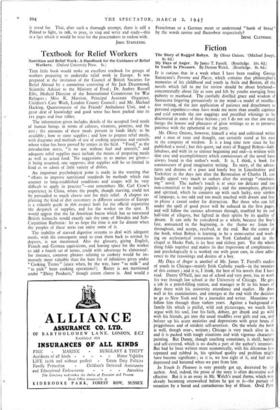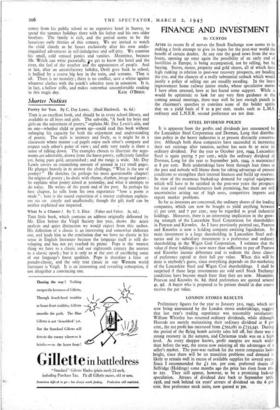Fiction
My Days of Anger. By James T. Farrell (Roulledge. 10s. 6d.) In Youth Is Pleasure. By Denton Welch. (Routledge. 8s. 6d.) IT is curious that in a week when I have been reading George Santayana's Persons and Places, which contains that philosopher's memories of his childhood and youth in Avila and Boston, all the novels which fall to me for review should be about boyhood—. concentratedly about life as seen and felt by youths emerging from puberty to manhood. The carefully distilled grace and wisdom of Santayana lingering persuasively in my mind—a model of recollec- tive writing, of the just application of patience and detachment to personal experience—may have made me more than usually captious and cold towards the raw naggings and prettified whinings to be discovered in some of these fictions ; yet I do not see that one need forego the lessons and pleasures of great writings so as to preserve patience with the ephemeral or the petty.
Mr. Oliver Onions, however, himself a wise and cultivated writer and a man of taste and thought, can certainly stand at his ease in the company of wisdom. It is a long time now since he has published a novel ; but this queer, sad story of Ragged Robyn—half- fabulous, and with its so sinister beginning and end—is written with that ease and accomplishment which connoisseurs of the novel have always found in this author's work. It is, I think, a book for connoisseurs of good imaginative writing. Its story, of the adven- tures and dreams of a poor and lonely boy in Lincolnshire and Yorkshire in the days just after the Restoration of Charles II, can hardly appeal very much to seekers after the average "entertain- ing" novel. The author's touch is at once too delicate and too non-committal to be easily popular ; and the atmosphere, physical and spiritual, which he conjures up with such lucky, easy strokes of language, is too odd and too much touched with dream and fear to please a casual seeker for distraction. But those who can fall under the spell of good prose will be seduced in the first pages, and will follow the curious adventure through, troubled by its sad half-hint of allegory, but lighted in their spirits by its quality of dream. It can only be considered as a whole, because the boy's fate, announced in the beginning, is the theme we listen for throughout, and accept, resolved, at the end. But the centre of the book, when Robyn is learning to be a stone-cutter and work- ing on ecclesiastical restorations in York Cathedral and in the chapel at Maske Park, is its best and richest part. Yet the whole thing folds together and makes its due impression of completeness; and psychologically it is worked out with great care, in close adhe- rence to the reasonings and desires of a boy.
My Days of Anger is another of Mr. James T. Farrell's studies of youth in Chicago—mainly Irish Catholic youth—in the twenties of this century ; and it is, I think, the best of his novels that I have read. Danny O'Neill, just out of school and very poor, has to work his way through law school at the University of Chicago. He gets a job in a petrol-filling station, and manages to fit in his hours of duty there with his university attendance and studies. He does well in his examinations, and emerges at the end with the decision to go to New York and be a journalist and writer. Meantime we follow him through three violent years. Against a background ot family life which is pitiful, wild and picturesque, we watch him argue with his soul, lose his faith, debate, get drunk and go wild with his friends, get into the usual muddles over girls and sex, and . bolster up his acute anxieties and depressions with great bouts of priggishness and of strident self-assertion. On the whole the book is well, though over-, written ; Chicago is very much alive in it,
and it is packed with tough situations and with vigorous character- painting. But Danny, though touching sometimes, is shrill, boring and self-centred, which is no doubt. a part of the author's intention.
But had he been written more economically, with his dilemmas less repeated and rubbed in, his spiritual quality and problem might have become significant ; as it is, we lose sight of it, and feel only depressed and battered when we part from him.
In Youth Is Pleasure is very prettily got up, decorated by its author. And, indeed, the prose of the story is often decorative and effective. But it is an essay in Mr. Welch's usual theme, which was already becoming overworked before he lot to it—the pursuit of sensation by a bored and cantankerous boy of fifteen. Orvil Pyrn comes from his public school to an expensive hotel in Surrey, to spend the summer holidays there with his father and his two older brothers. The family is rich, and the period seems to be the luxurious early thirties of this century. We are invited to watch the child closely as he fusses exclusively after his own undis- tinguished adventures in self-indulgence and self-pity. We examine his small, cold sensual panics and vanities. Meantime, because Mr. Welch can write pictorially, re get to know the hotel and the river, the feel of the weather and the appearances of people. And at last, after an unsatisfactory holiday, Orvil goes back to school, is bullied by a coarse big boy in the train, and screams. That is all. There is no morality ; there is no conflict, save a whine against whatever clashes with the youth's selective taste in sensation. It is, in fact, a hollow trifle, and makes somewhat uncomfortable reading



























 Previous page
Previous page